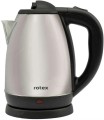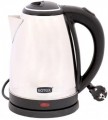The nominal capacity of a kettle refers to the maximum amount of water that can be safely poured into it, and it is typically indicated by the water level indicator. In the case of brewing sets (see "Type"), the nominal capacity refers to the main kettle, while the capacity of the teapot is listed separately (see below).
The capacity of the electric kettle directly affects the amount of water that can be heated at once. A larger capacity allows for heating more water, but this also means the kettle will be larger and heavier. Additionally, heating a larger volume of water requires either more power or a longer time. Therefore, it is important to consider one's actual needs when choosing a kettle based on its capacity. For example,
mini-kettles for travelling (or for one person) have a volume of up to 1 liter. For home use in a family of 2 – 3 people, a 1,5 – 2 liter model is enough. Devices for
2 – 3 liters are already well suited for a small office or a similar situation. The most spacious electric kettles are designed to hold 10 liters or more, and are typically used in public places such as canteens and cafes for dispensing hot water.
The power consumed by the kettle during operation is actually the power of the heating element installed in the device.
Two working moments depend on this parameter: heating intensity and electricity consumption. On the one hand, the
high power of the heater allows you to quickly heat up a certain volume of water and saves time. On the other hand, the power consumption of such a device will also be appropriate. The wattage of a kettle's heater typically does not have a significant impact on electricity bills since the energy consumption required to heat a given volume of water remains the same regardless of the heater's power rating. However, there may be certain issues related to electrical connectivity. For example, if the wiring is weak or the fuses are improperly sized, the operation of a high-power heater may cause power outages. Additionally, devices with a power rating greater than 3500 W cannot be connected to a regular electrical outlet and require a specific power format. Consequently, even the largest thermal pots, which typically have a capacity of 10 L or more, are rarely equipped with heaters more powerful than 3000 W, since this power rating is sufficient for their intended use and can be connected to a standard electrical outlet.

